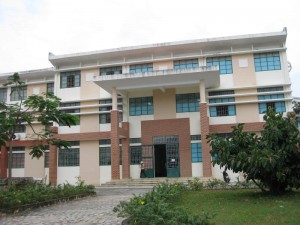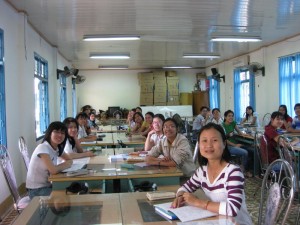A little bit about the library and more classes
02/11/09
Tuesday morning I walked uphill to the University library, which was built in 2003 with assistance from the World Bank. The building, which is spacious and has hundreds of carrels for users, overlooks the seaside. With the assistance of a capable and patient translator, I spent the next two hours talking with the librarians. 
Before 2000, the library was a unit in the Training Department, and was based on Russian standards. Since then it has become an independent unit, but it is hampered by insufficient material resources—both print and electronic resources as well as computers. The librarians have an “online database,” which the World Bank helped them establish in 2003, but I don’t know if it is searchable from the University’s web page.
The head librarian (a journalist by training) explained that there are several reasons why the library is currently not as important to faculty and students as it could be. First, since the University does not have the credit-based system of education, students have little need for the library because few faculty require them to do research necessitating library use. Also, faculty are primarily teachers, and are not expected to do research, although that is likely to change. Faculty also prefer to keep the books in their offices (does this sound familiar)? Second, the library’s computer equipment has not been updated since 2001 and they charge for the use of the Internet. Third, the library lacks adequate human resources, with few people possessing the training they need to do their jobs. There are no student library workers—that concept seems quite foreign here. Fourth, there is a significant lack of material resources. As I understand it, the library has only 12,000 titles (10% of them in English). I don’t know the number of students enrolled here, but I have heard as many as 30,000. Even in a digital age, the collection has far too few books. Moreover, before 2006 this was a fisheries school, so the library collection also reflects that emphasis rather than being positioned to serve the needs of a multi-disciplinary university. Finally, the limited English capacity of the students and faculty is a factor limiting use of the digital library because titles in it are mainly in English.
When I asked about student workers I learned that last year some students volunteered to manage the reading room in exchange for longer borrowing periods for books. Library instruction consists of giving first year students a text or document about library use, holding a workshop, and then giving them a test. If they pass, they are issued a library card. I also asked about networks, which have worked very well for libraries like Bluffton University and I.U. East, and learned that distances are too great, transportation is inadequate, technology is not yet in place (online catalogs or even equipment to scan and fax), and the potential members of a network have limited collections. As you can deduce from what I’ve written, the librarians here face a number of challenges (I resist the urge to say “many” because I’m trying to be positive). We’ll be meeting again next week, so any and all ideas are welcome!
The remainder of the day was filled with another class and a meeting. Students in the Tuesday listening class are the same as those in Monday's Reading class, so I asked what they remembered from my introduction and was surprised to learn that I had a big family--5 sons! It seems the student had confused the difference between nephews and sons. Students here are comfortable asking for help with personal problems. Before class one young man sat down next to me and began describing his persistent cough. He wondered if I could give him something for it. When I asked what he had taken already, he answered "cough sauce." Syrup and sauce are rather similar, wouldn't you agree? And another student asked for my dormitory room number and "may I call on you tonight." As you can see, students are eager to converse in English. The concept of "office hours" hasn't hit here yet since faculty do not have private offices. Instead, the faculty of an entire department, like English, are housed in one room and share one or two computers. 
On Wednesday I met the second section of the Listening 6 class, pictured above. What an enjoyable group of students! I continue working on workshop preparations, and tonight I will be meeting a British volunteer in the city for dinner. We're going to an Italian restaurant--imagine that!
